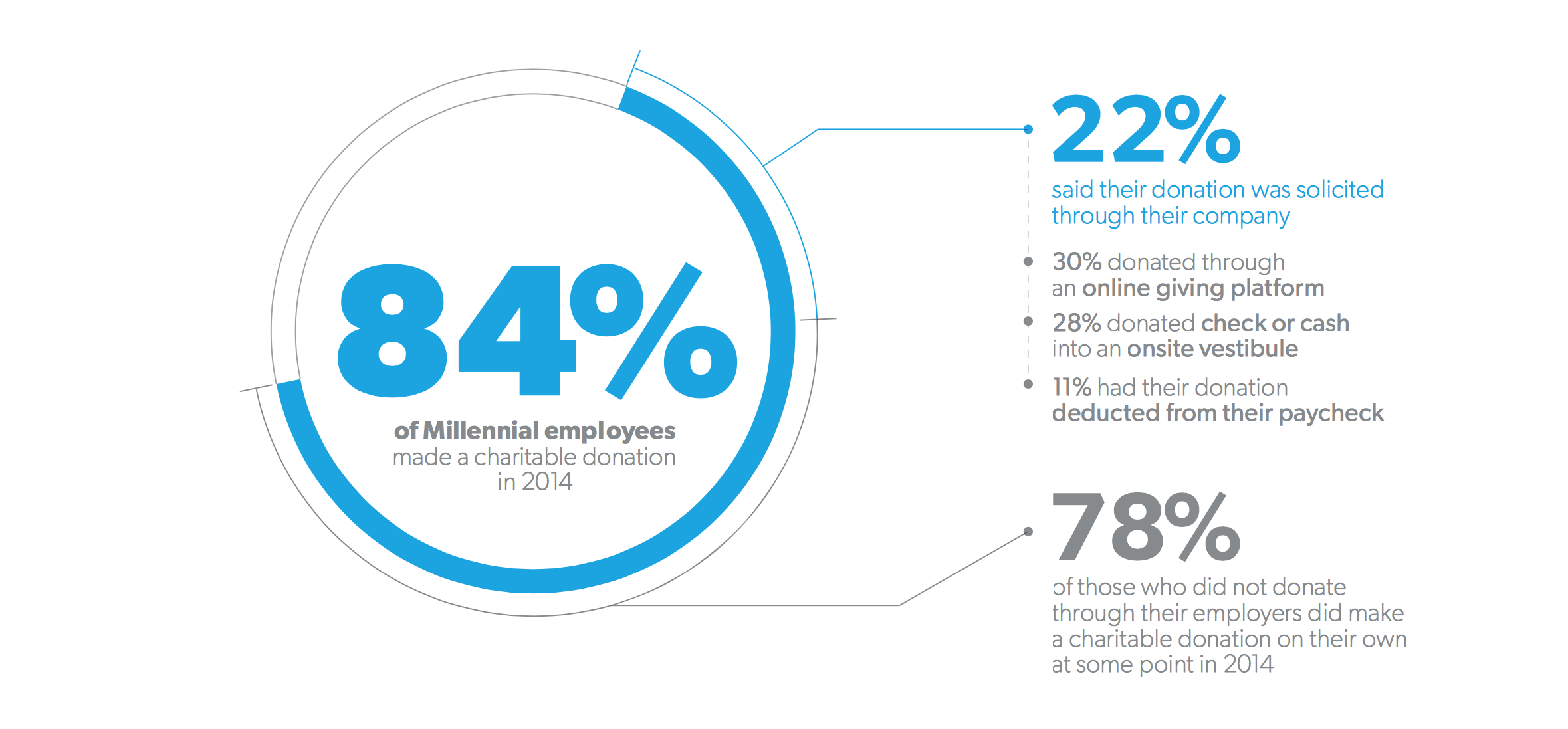
Social responsibility is more than a company’s marketing strategy — it’s quickly becoming a way to retain millennial employees as well.
Despite having a reputation for being arrogant and lazy, millennials are in actuality highly philanthropic.
Younger workers want more than just a paycheck from their employer; they also want to feel like they’re making an impact on the community.
According to a 2015 Millennial Impact Report, over 30 million millennials are employed and 84 percent of these employees made a charitable donation in 2014. That’s on top of the 78 percent of millennials who made a charitable donation on their own without going through an employer.

For companies already committed to social responsibility, this is good news. Loyalty to a brand or employer extends beyond the services and products a business provides; employees want to feel good about working for a company that cares about supporting socially conscious and international organizations.
Take Google, for example. For the past four years, Google has topped the Global CSR RepTrak rankings because of its commitment to good causes and positive influence on society and environmental responsibility.
Google’s reputation as one of the top 100 places to work is bolstered by their reputation as one of the premier socially conscious organizations; it’s no wonder 20 percent of millennials say they want to work at Google.
“I resolved to stop accumulating and begin the infinitely more serious and difficult task of wise distribution.” — Andrew Carnegie
As a Partner and Chief Growth Officer at Mabbly, I work in an office full of millennials, where corporate social responsibility is beginning to make its presence known. One organization my co-workers at Mabbly and I recently collaborated with is Cuisine for Cancer, a nonprofit fundraiser hosted by Stephen Lee of ChariPick.org and Jonny Imerman of Imerman Angels.
Encouraging my team to help out was easy: all of us were sold on the idea of having fun while giving back at the same time, so we jumped right into building Cuisine for Cancer’s website.
Roughly five of us volunteered at the successful event and, in addition to the internal warm and fuzzy feelings we harbored, the recognition we received from the organizers made us feel that we had truly made an impact on the community.
That feeling of being able to “make an impact every day” is what Lee hopes to instill in young people via the ChariPick app and events like Cuisine for Cancer. It’s certainly a feeling that motivates me to continue to give back.
Make an impact every day
The opportunity to partner with large fundraising events doesn’t always present itself, but millennials can still give back every day in little ways. Here are four ways companies can encourage a company culture of philanthropy amongst their employees:
1. Turn philanthropy into a competition.
Millennials view games and incentives as motivators to get the job done. Forty-three percent of millennials say they are more likely to donate if a competitive element was involved and 24 percent of managers donated because they took part in a company-wide competition.
2. Offer company-matched donations.
Employees feel encouraged to give back if their donations are matched by their employers. Sixty-nine percent of millennials said they were more likely to donate if their company offered to match their donation. Matching gifts motivate both managers and employees, all while building a company’s charitable reputation.
3. Utilize digital giving platforms.
One of the biggest takeaways from this report is understanding where and how millennials choose to give back. Last year 30 percent of millennials gave back through an online giving platform and 28 percent donated a check or cash online. Merging a digital platform, like ChariPick, with a business would make it easy to encourage employees to donate a portion of their paycheck to charity.
4. Encourage direct peer-to-peer influence.
The people we work with can influence our philanthropic choices. When millennials were asked to donate by their peers, roughly 46 percent of millennial employers complied. Interestingly, when supervisors and CEOs asked their young employees to donate, less than 30 percent gave back, suggesting that millennials are more likely to comply with a request from co-workers than a higher-ranking executive.
With millennials projected to make up 50 percent of the workforce by 2020, there is value in exploiting their passions. Companies need to think beyond a 401(k) plan and fancy company perks to attract and keep millennials engaged as employees. As we fast approach 2020, companies will need to focus on strengthening their CSR strategies when recruiting new millennial employees.
This article has been edited and condensed.
Vlad Moldavskiy is Partner and Chief Growth Officer at Mabbly, a fast growing digital agency in Chicago. Connect with @vmoldavskiy on Twitter.
© YFS Magazine. All Rights Reserved. Copying prohibited. All material is protected by U.S. and international copyright laws. Unauthorized reproduction or distribution of this material is prohibited. Sharing of this material under Attribution-NonCommercial-NoDerivatives 4.0 International terms, listed here, is permitted.













